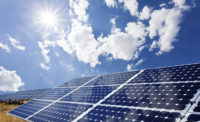Danone, France, announced a NZ$40 million investment in its Nutricia spray drying plant in order to achieve carbon neutrality by 2021. This milestone will be driven primarily by the installation of a NZ$30 million state-of-the-art biomass boiler that will reduce the plant’s CO2 emissions by 20,000 tons per year.
Danone’s Nutricia spray drying plant is located at Balclutha, in the Otago region of the South Island. The plant processes raw milk sourced from 18 local farms into powder used as the base for production of infant milk formula brands, including Aptamil and Karicare.
Danone’s biomass boiler will be powered by sustainable wood fuels, which will be sourced locally.
“This significant investment, in what we expect to be New Zealand’s first carbon neutral plant of its kind, underscores Danone’s global ‘One Planet. One Health’ vision and the belief that the health of people and planet are interconnected,” says Cyril Marniquet, New Zealand operations director. “We share the New Zealand government’s ambitions in delivering a low-emissions, climate-resilient future. At Danone, we’ve set ourselves an objective of becoming a carbon neutral company across our entire scope – from farm to family – by 2050. It is through key investments like this one that we take a step forward toward reaching this ambition.”
To bring its ‘One Planet. One Health’ vision to life, Danone defined its 2030 Goals, aligned with the UN Sustainable Development Goals (SDGs), including preserving and renewing the planet’s resources.
As part of its global journey toward carbon neutrality by 2050, Danone also set intermediate targets – officially approved by the SBTi (Science-Based Targets initiative) – in line with the global measures necessary to meet the Paris Agreement objective of keeping global warming below 2°C. These targets include a 50% reduction in carbon emissions intensity across the company’s full scope by 2030. From 2016-2018, Danone already reduced greenhouse gas emissions intensity by 15.6% worldwide.
State-of-the-art biomass boiler
Veolia Environnement S.A., France, will be responsible for designing and managing the construction of the biomass boiler.
“Veolia has supported Danone with the development of the biomass project, aligning available biomass resources with optimal conversion technologies, while leveraging the company’s operational expertise to achieve the best possible environmental footprint for the site,” says Alexandre Lagny, general manager New Zealand for Veolia.
Danone's investment in the plant also includes the installation of a new water treatment plant to more efficiently treat water waste, while ensuring compliance with Danone's stringent global clean water standards.







